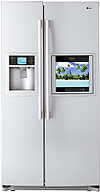This is one of the most brilliant inventions. The Refrigerator a.k.a. Fridge is a very useful and important electronic device on which many people’s lives depend or many people depend to earn a living or to better their living standards.


This is one of the most brilliant inventions. The Refrigerator a.k.a. Fridge is a very useful and important electronic device on which many people’s lives depend or many people depend to earn a living or to better their living standards.
The fridge was first invented by a one Dr. William Cullen (at the University of Glasgow in the 1740s) who developed the theory on which it works, viz how a certain chemical went through various pipes and then turned into molecules that evaporated easily so it could keep things cool.
However, he did not put his thoughts into actions and hence, the refrigerator could not become a reality a century or so later.
Imagine how many medical applications the fridge is put to! Aeroplanes, Cars, offices, hotels and some homes require refrigeration services in one form or the other, e.g. Air-conditioning, deep freezing, cooling etc.
In the advent of the present day mechanical refrigeration systems, people cooled their stuff with ice and snow, either found locally or brought down from the mountains.
The first cellars were holes dug into the ground and lined with wood or straw and packed with snow and ice: this was the only means of cooling.
In actual sense, Refrigeration is the process of absorbing heat from an enclosed space, or from a substance, to lower its temperature.
A refrigerator uses the evaporation of a liquid to absorb heat, that is, as the liquid absorbs heat, it gets heated up and it evaporates, this evaporation creates a cooling effect as the heat is removed.
The liquid, or refrigerant, used in a refrigerator evaporates at an extremely low temperature, creating freezing temperatures inside the refrigerator.
It’s all based on the theory, that, a liquid is rapidly vaporized (through compression) - the quickly expanding vapour requires kinetic (motion) energy and draws the energy needed from the surrounding area - which loses energy and becomes cooler.
Cooling caused by the rapid expansion of gases is the primary means of refrigeration today. The first
practical refrigerating machine was built by Jacob Perkins in 1834.
In 1844, an American Doctor, John Gorrie, built a refrigerator to make ice to cool the air for his yellow fever patients. German engineer Carl von Linden patented not a refrigerator but the process of liquefying gas in 1876 that is part of basic refrigeration technology.
Basically, the refrigerator has a cycle that is continuous.
Let us assume that the refrigerant (gas) being used is pure ammonia, which boils at -27 degrees F, this is what is likely to happen to keep the refrigerator cool; the compressor compresses the ammonia gas and the compressed gas heats up as it is pressurized, the coils on the back of the fridge let the hot ammonia gas lose its heat.
The ammonia gas condenses into ammonia liquid, this high pressure liquid flows through an expansion valve. Behind the valve, there is a high pressure liquid, in front of the valve; there is a low pressure gas (because the compressor is sucking the gas out of that side).
The gas immediately boils and vaporizes, its temperature dropping to -27 F.
This makes the inside of the refrigerator cold. The cold ammonia gas is sucked up by the compressor, and the cycle repeats. It does not matter what form of energy is used to drive the refrigerator, the common type is electricity; however, in rural areas, they have been using kerosene to run the fridges.
They simply light a fire, the fire heats the gas, causing the gas to expand and create pressure, and this drives the gas through the expansion valve and the rest is nearly the same.
The greatest drawback of the refrigerator is the fact that, many of the older types use gas that is quite unfriendly to the environment.
A word of caution, when buying a refrigerator, look out for what kind of gas it uses; there are new brands that use a highly inflammable gas that could cause a fire at the slightest leakage (if the condenser tubing or compressor gets damaged).
This includes butane, propane, isobutane and certain other
hydrocarbons. Flammable refrigerants are considered dangerous because of their risks, they normally burn with an invisible flame.
A word of caution, if you think your refrigerator has a gas leak, kindly unplug it from the power mains, keep any device that could cause a spark and hence a fire away and immediately call a qualified service personnel.
Ends


